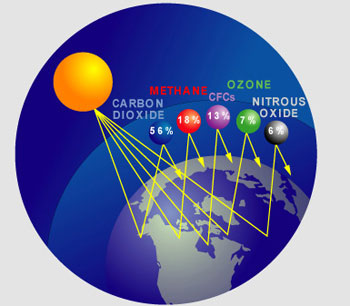Stop spam and save planet from greenhouse gases
 Washington, April 27 : A new research has highlighted the importance of stopping spam as it produces greenhouse gases that harms the planet.
Washington, April 27 : A new research has highlighted the importance of stopping spam as it produces greenhouse gases that harms the planet.
According to a report in The Sydney Morning Herald, the research shows all those unsolicited messages, 62 trillion of them last year, generate greenhouse gases equivalent to driving a car around the planet 1.6 million times.
More than 80 per cent of the world's email traffic is now deemed spam and - between the energy devoted to sending, storing and sorting phoney messages - 33 billion kilowatt-hours of power is wasted.
The study, commissioned by the computer security firm McAfee and conducted by climate change analysts at ICF International, notes that when one spammer, McColo, was closed by its internet service provider last November, worldwide spam fell by 70 per cent overnight.
But, the robot computer networks, or botnets, that McColo harnessed to send spam were quickly redeployed and the relief was short-lived, McAfee's regional spokesman, Michael Sentonas, said.
"A lot of spam is generated from botnets and that makes it very hard to identify where it's coming from," he said. "The botnet may be spread across 10 countries," he added.
"Today, spam comes with malware (malicious software) with links to compromised websites," Sentonas said. "Spam is a great tool to steal someone''s identity, (and) identity theft rates are growing exponentially," he added.
Globally, one reason for that proliferation is email servers that can be used anonymously.
According to Sentonas, with a single spam campaign involving up to one million messages and spammers needing a success rate of only 2 to 5 per cent, it takes little effort to steal credit card details, for example, and make a profit.
Peter Coroneos, chief executive of the Internet Industry Association, believes that spam can only be thwarted by understanding - and undermining - the economics of its use.
Much as polluters once saw little reason to curb the chemicals they spewed into the sky because the air was considered a free resource, spammers now send their messages through the Internet at virtually no cost.
Charging for each email, even less than one cent per message, would quickly make most spam unviable, according to Coroneos, but consumers have shown little willingness to pay for a service they have always considered free.
The only other solution Coroneos sees is greater authentication. Just as some banks now require a customer to use a token to verify their identity, this could be used to combat spam. (ANI)